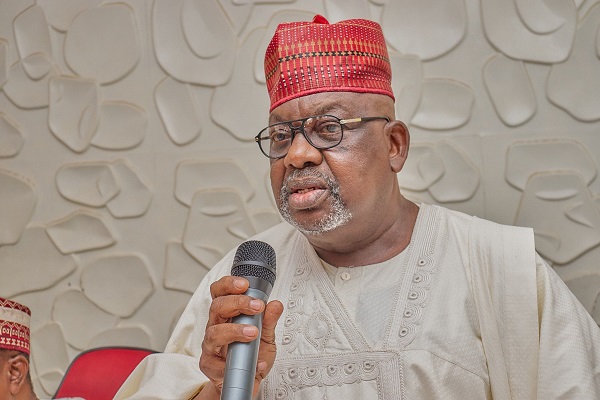- As another legislator justifies donation of burial materials to constituents
The Speaker of the Niger State House of Assembly, Abdulamlik Sarkindaji, has announced that he will not to attend the proposed wedding ceremony for 100 orphan girls in his constituency, leading to the cancellation of the event.
Sarkindaji made the decision in response to the Women’s Affairs Minister, Uju Kennedy-Ohanenye, taking legal action against the Speaker to prevent the wedding from taking place.
The Minister in a press conference in Abuja disclosed that she has “filed for injunction to stop him from whatever he is planning to do on the 24th, until a thorough investigation is carried out on those girls, find out whether they gave their consent, their ages, find out the people marrying them.”
During a press briefing on Tuesday, the Speaker stressed that the minister has exceeded her authority. adding that she should assume responsibility for overseeing the wedding ceremony.
The Speaker confirmed that he had already provided financial assistance to the parents of the girls through the traditional leaders and clerics of his constituency. He assured that he had no intention of retracting this support.
As part of his constituency project, the Speaker Sarkindaji announced his plans to marry off 100 female orphans in the state, saying he was “concerned with” their growing number as a result of activities of banditry.
In a similar development, the senator representing Kano Central in the Senate, Rufai Sani Hanga, has revealed the reasons behind the donation of burial materials to his constituents in Kano State.
The members of the opposition parties in Kano State had lashed out at the lawmaker elected on the platform of the New Nigeria Peoples Party (NNPP), saying he was honouring the dead instead of empowering his constituents.
Addressing news people in Kano on Monday, May 13, 2024, Hanga said he has no regrets donating clay pots and textile materials, used in burying corpses, to his constituents.

The senator said the gesture is a tradition in his family.
He said: “I have no regrets whatsoever purchasing and donating burial materials to my constituents. I did not use constituency project money to buy them; I used my personal money.
“Furthermore, the gesture is a tradition in my family as I grew up witnessing my father carrying it out.
“Before I became a senator, many people knew me with the gesture; when I became senator, some groups came requesting that I should purchase materials for them to maintain their graveyards.
“And I decided to spread the gesture to all the 15 Local Government Areas of my constituency.”
Hanga said apart from the purchase and donation of pots and other burial materials, he had been delivering other dividends of democracy to his constituents.
The senator added: “As part of my constituency project, we are building roads in about 10 Local Government Areas and women centres in about six Local Councils.
“This is after giving women and youths monetary incentives to selected beneficiaries from the 15 Local Government Areas.
“In the education sector, we have sponsored no fewer than 2,000 students to study at the Kano State Polytechnic.
“We paid school fees 1500 Bayero University, Kano (BUK) students as part of our support to their education.”
The lawmaker said following a request by some Islamic scholars, he also built an Islammiyya School at Dan Dishe town in Kano State.
Hanga added that he had distributed 450 bags of assorted grains such as rice and millet as well as spaghetti to each of the 15 Local Government Areas in his constituency.
On the Niger mass wedding, the female orphans whose ages had yet to be disclosed reportedly lost their parents to banditry attacks in the Mariga Local Government Area.
The UNDP notes that: “Women are not only the most vulnerable victims of conflict, but they are also disproportionately disadvantaged in terms of resources, access to services, education, and human rights. Their vulnerability affects their ability to reach their full potential in society.
“In Northeast Nigeria, women and girls from conflict-affected areas make up the bulk of the vulnerable internally displaced persons with many of these women entirely responsible for the safety and financial stability of their families. To ensure that women reclaim their lives and create a more prosperous future for themselves and their families, it is imperative that they access social and economic services.
However, it does appear that Speaker Sarkindaji, has neither given consideration to empowering these orphans nor ensured that they have access to education. And although he expressed concern about the growing number of orphaned girls on account of banditry, he might not have given a thought to the baby boom which will sooner than later hit the state, thereby increasing the number of helpless citizens when the husbands of these orphans begin to exercise their conjugal rights.
But the Speaker may have made arrangements to settle them in affluent homes.
Addressing reporters in Minna, Niger State capital, Sarkindaji, who represents the Mariga State Constituency, disclosed that he would pay the dowries for the bridegrooms as part of his constituency project.
According to him, all necessary materials for the marriage ceremony schedule for May 24 at Bangi, the headquarters of Mariga Local Government Area, had been procured.
According to a Daily Trust report, he said that 100 girls who would be married off were carefully selected from the 170 girls whose names were submitted.
The Speaker, described the initiative as part of his constituency empowerment project, “aimed at alleviating the suffering of the impoverished.”
Sarkindaji, however, noted that the Niger State Governor, Mohammed Umar Bago, and the Emir of Kontagora, Alhaji Mohammed Barau, would serve as guardians to the female orphans during the mass marriage ceremony.
Expected to attend the ceremony is the Kano State Commander General of the Hisbah Board, Sheikh Aminu Daurawa.
According to an International Council of Nurses article, The Girl Child Education Fund brings education, hope and comfort to orphaned girls in Africa: “Educating girls plays a key role in improved health and poverty reduction. It leads to lower birth rates and infant mortality rates, better health, nutrition and gender equity. Girls who are educated earn higher incomes, leading to higher productivity, strengthened economies and stable, resilient societies.”





